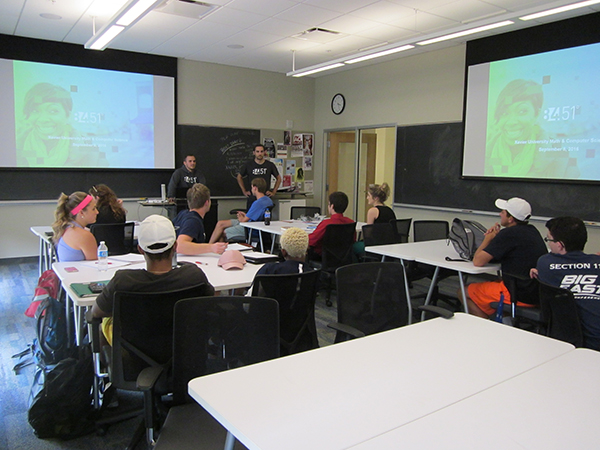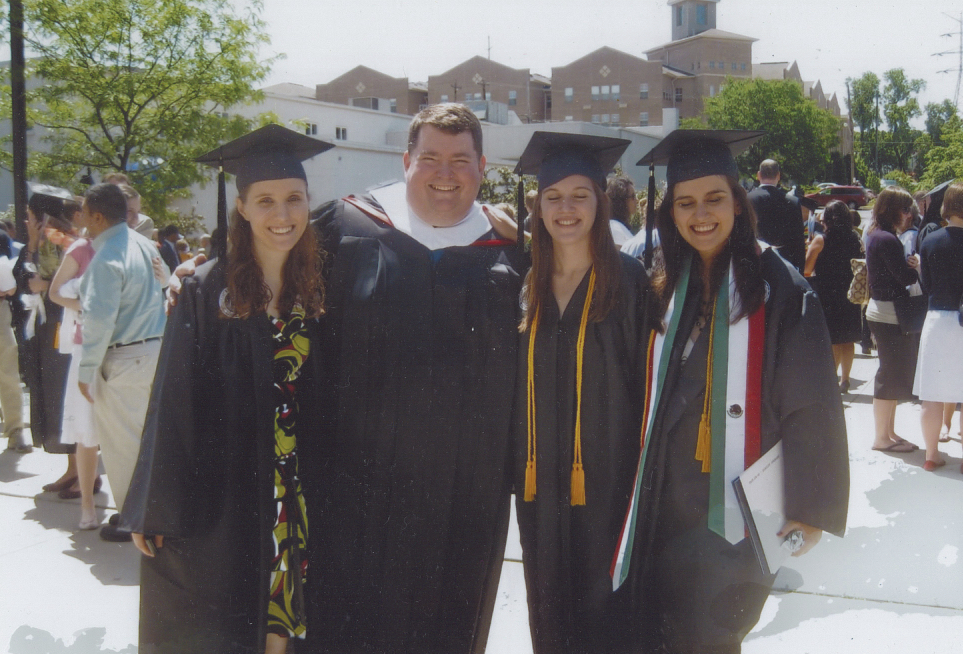Careers in Mathematics

data analysts at 84.51o talk to MATH 311
students about summer internships and
data analyst opportunities.
Through the study of mathematics, students develop their problem-solving and critical thinking skills. There are career opportunities in all sectors of business and industry for individuals trained in the mathematical sciences, which include computer science and statistics. A mathematics background is also excellent preparation for entry into several of the professions as well as for graduate work in many areas.
So what can you do with a degree in mathematics? Actually, just about anything. No really, we mean it -- for pretty much any list you can make of aspects you'd like in a job (dress up? just jeans? work with people? work on your own? etc.), there's some mathematical career that's right for you. One of the reasons that mathematically-trained people are needed in almost every field is that they are known for excellent problem-solving and critical thinking skills.
Furthermore, according to CareerCast.com, "The Best Jobs of 2019
"Data and numbers make up CareerCast.com's annual Jobs Rated report -- and the careers at the top of the 2019 Jobs Rated report are made up from data and numbers.The demand for STEM professionals is an oft-repeated theme of the Jobs Rated report, with 2019 being no exception. In particular in the 2019 edition, professions founded on the collection, interpretation and protection of data lead the way."
Career Opportunities
 Check out the MAA Career Resource Center!
Check out the MAA Career Resource Center!
Actuarial Mathematics
The application of mathematics, particularly probability and statistics, to the insurance industry. For more info, check out Be An Actuary, Society of Actuaries (SOA) or Casualty Actuary Society. Also see Xavier's Actuarial Science Careers page.
Applied Mathematics
Often this means working on problems in physics, chemistry, and engineering from a mathematical perspective. For more info, check the Society for Industrial and Applied Mathematics' career site. Most government jobs, such as with Sandia, Argonne, or Oak Ridge National Labs, NASA, or the Jet Propulsion Lab, NIST, or the Department of Agriculture are within applied mathematics. Some positions at the National Security Agency are applied mathematics and some are pure mathematics.
Biomathematics
The application of mathematics in the health sciences. Mathematical biologists apply mathematical, computational and experimental techniques to investigate biological processes at all levels, from the molecular to the population (Santiago Schnell, President, The Society for Mathematical Biology). NIMbios has a resource page with links related to mathematical biology.
Biostatistics
The application of statistics in the health sciences. Here's an overview of biostatistics careers, What does a career in biostatistics actually look like? (ASA)
Computer Science
Typical careers in computer science include programming, systems analysts, software design, network administration, web design and programming, technical consulting and client-server programming. Students choosing to continue on for advanced degrees may choose careers in computer science research and computer design. See Xavier's Department of Computer Science Careers in Computer Science page.
Financial Mathematics (or Mathematical Finance)
Mathematics used on Wall Street, for mortgage backing, financial derivatives, and stock market analysis. The field is fairly new and there are lots of professional master's programs available.
Law
A major in mathematics is a good preparation for law school. Consider this excerpt from the book 101 Careers in Mathematics: "I attribute much of my academic success at Columbia University School of Law to having learned, through the study of mathematics... how to analyze complicated principles. Now I practice law in one of the country's largest law firms. I feel I have done well in my job, and I attribute much of that success to my facility with numbers and mathematical theory." - Jonathan Blattmachr, Law Partner, Milbank, Tweed, Hadley and McCloy
Medicine
A major in mathematics is a good preparation for medical school. In the book, 101 Careers in Mathematics, Dr. Arthur Staddon, M.D. tells of his experience:
"I majored in mathematics mainly because I enjoyed the thinking that mathematics requires, and I found it fun to do. I was interested in applying my skills in math and science with my interest in people and service. I was concerned that I might have difficulty being admitted to medical school, not being a typical premed. I found that doing well in mathematics opened the doors to the very best medical schools. The rigorous discipline in training in analytical thought processes prepared me extremely well for medical school. I found no other courses that were more rigorous than those that I had encountered in my mathematics studies.
All of my work has been well grounded because of my initial studies in mathematics. The ability to think logically and to analyze problems and situations clearly has been invaluable." -Arthur Staddon, M.D., Hematology-Oncology, University of Pennsylvania School of Medicine
Operations Research
The application of mathematics to problems of optimization, especially in the field of business. For more info, check out the INFORMS Career Booklet on "Is a Career in Operations Research/Management Science Right for You?"
Research Mathematics
The study of mathematics for its own sake. Just about any mathematics faculty member will be more than happy to chat with you about this. As a career, this almost always requires graduate school; to investigate the possibilities, think about doing a summer REU or internship. See the Summer Research Opportunities (REUs) under the Undergraduate Math Research link on the left.
Statistics
"Statistician is the coolest job you've never heard of." Statisticians contribute to society by protecting endangered species and managing the impacts of climate change, making medicines more effective and reducing hunger and disease. They have fun helping professional sports teams pick the next season's new players or working on the data science team of a U.S.. presidential campaign. Demand for statisticians is growing as are their salaries (Burtch-Works 2017 Study).
Teaching
At all levels. Here's Education World's state certification listings. To teach at the community college level, you should get a Master's degree (either in mathematics or a Master of Arts in Teaching); to teach at the college level, you should get a Ph.D. (in mathematics, mathematics education, applied mathematics, or statistics).
Technical Writing
This includes everything from science reporting for periodicals to writing documentation for computer software to editing textbooks. For more info, check out Careers in Technical Writing. Also check out this mini-biography of Allyn Jackson, who spent 31 years as a technical writer with the American Mathematical Society.

What about Graduate School?
Lots of opportunities are available to those with a bachelor's degree in mathematics. In some fields, such as biostatistics, financial mathematics, or operations research, a professional master's degree is preferred (or at least qualifies one for a higher salary). In research mathematics, a Ph.D. is required. Keep in mind: graduate school in the mathematical sciences is often free. Most Ph.D. programs in pure mathematics have financial support available in the form of tuition waivers plus a research stipend or a part-time teaching/grading job. This is also true for Ph.D. programs in statistics, applied mathematics, computer science, and operations research. Financial support for master's degrees varies wildly from field to field and sometimes from school to school; it's rarely available for pure mathematics, but is much more available for applied mathematics, statistics, financial mathematics, and biostatistics.
- Peterson's Overview of Graduate School Programs and Degrees has articles to help consider graduate school options.
- Find a graduate program in the mathematical sciences (AMS)
- List of mathematical sciences graduate programs in the U.S. by annual survey.
- Want advanced work in actuarial science? Check this list of programs (SOA).
Further resources
- The Math Jobs Web Site
- The Mathematical Association of America's Career/Employment Resources site
- Learn How to Become Careers in Mathematics
- University of Georgia's Why Major in Mathematics?
The Xavier University Career Development Office serves as Xavier's comprehensive career office and is the primary point-of-contact for employers hoping to recruit Xavier students from a variety of academic programs. They also serve as the career development resource for all students and alumni with any major and will assist in job and internship search.